Angela Slatter's Blog, page 32
January 12, 2018
Pulp Fiction Bestsellers of 2017
 Very happy to see that both Vigil and Corpselight made the 2017 Bestseller list from Pulp Fiction Booksellers!
Very happy to see that both Vigil and Corpselight made the 2017 Bestseller list from Pulp Fiction Booksellers!
Science Fiction and Fantasy
Vigil (Verity Fassbinder 01) by Angela Slatter
Corpselight (Verity Fassbinder 02) by Angela Slatter
The Collapsing Empire (Flow 01) by John Scalzi
The Goblin Emperor by Katherine Addison
Behind the Throne (Indranan War 01) by K B Wagers
Killing Gravity (Voidwitch 01) by Corey J White
Cold Welcome (Vatta’s Peace 01) by Elizabeth Moon
Too Like the Lightning (Terra Ignota 01) by Ada Palmer
The Trials of Morrigan Crow (Nevermoor 01) by Jessica Townsend
Norse Mythology by Neil Gaiman

Crime and Mystery
Dregs (William Wisting 01) by Jorn Lier Horst
The Dry (Aaron Falk 01) by Jane Harper
The Death of Kings (John Madden 05) by Rennie Airth
Prussian Blue (Bernie Gunther 12) by Philip Kerr
Death in the Dordogne (Bruno, Chief of Police 01) by Martin Walker
The Human Files (K2 01) by Hans Olav Lahlum
River of Darkness (John Madden 01) by Rennie Airth
Earthly Remains (Commissario Brunetti 26) by Donna Leon
The Templar’s Last Secret (Bruno, Chief of Police 10) by Martin Walker
Police at the Station and They Don’t Look Friendly (Sean Duffy 06) by Adrian McKinty
January 10, 2018
Bitterwood
Re-stocked The Bitterwood Bible cards today, and remembered how much I love the cover of the book. Kathleen Jennings’ artwork always seems to be drawn straight from my head.
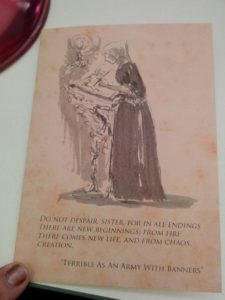

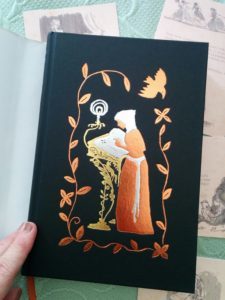
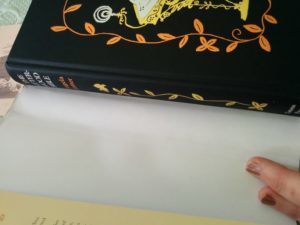
January 9, 2018
When you accidentally become the subject of an academic study …
… and fear someone has made a horrible mistake …
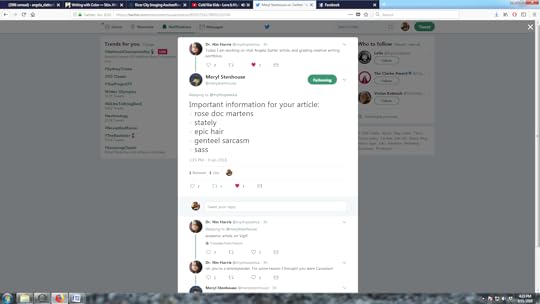
And so, Restoration
Since I had word last night from The Beloved Publisher (AKA Jo Fletcher) that she doesn’t hate the new Verity novel, Restoration, (in fact she’s really rather fond of it), I shall post this in happiness and relief. Coming in August 2018.
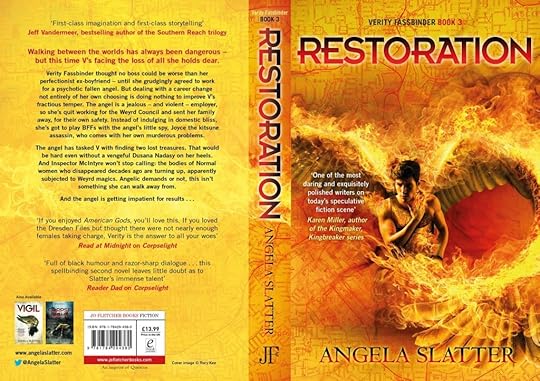
December 30, 2017
Happy New Year (almost)
For me 2017 was still a challenging year – I wasn’t sure I’d still be doing the whole writing thing – but nowhere near as awful as 2016.
So all good!
Starting 2018 with good friends and a positive outlook. Plus champers.
Happy New Year to you all!
December 5, 2017
RAF
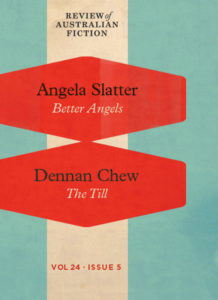 And here it is,the latest Review of Australian Fiction, with stories from yours truly and Mr Dennan Chew.
And here it is,the latest Review of Australian Fiction, with stories from yours truly and Mr Dennan Chew.
“Better Angels”
By Angela Slatter
‘How far down, missus?’
The woman’s staring not at the hole in the wet ground, nor at the tall bearded man who’s asked her a question, but back at the house behind her. She’s half-turned, the top of her torso twisted almost impossibly, almost fluidly, in defiance of the strictures of the steel-stayed corset beneath her plain black dress. The sandstone house is two storeys, wide verandahs running around both levels, walls punctured by doors and floor-to-ceiling windows, all of which are open, their shutters pinned back despite the cold and the rain.
‘Missus?’ His voice is low and rough, still thick with the accent of his native Bristol, but tender.
Fionnuala Farrell’s eyes are pinned on the small group clustered on the lower verandah: an older woman, plump, dark-haired, with a white apron over her navy frock; three small girls, hair as red-gold as their mother’s, not yet in mourning attire because no one had thought to make any for them so early in their young lives.
November 29, 2017
Review of Australian Fiction
 I’m delighted to announce I’ve got a new story in next Tuesday’s Review of Australian Fiction.
I’m delighted to announce I’ve got a new story in next Tuesday’s Review of Australian Fiction.
“Better Angels” (I guess it’s my tribute to, maybe rehabilitation of, Barbara Baynton’s “The Chosen Vessel”) will be paired with new writer Dennan Chew’s “The Till” – and I’m equally delighted that he’s my third author to introduce via RAF!
Dennan Chew is an aspiring writer of dark comedy, crime and suburban gothic. He has variously been a copy writer, MMA fighter, and personal trainer. He has a Bachelor of Commerce and an MBA, and is studying in the Masters of Creative Writing program at Sydney University. Dennan is currently working on his debut novel, Plan B; “The Till” is his first publication.
I’ll post links next week … of course, if you subscribe the latest issue will appear in your inbox bearing coffee and a bagel …
November 28, 2017
The Starlit Wood: Aliette de Bodard
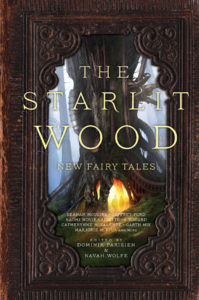 In this week’s Starlit Wood blog post, the wonderful Aliette de Bodard talks about “Pearl”.
In this week’s Starlit Wood blog post, the wonderful Aliette de Bodard talks about “Pearl”.
1. What was the inspiration for your story in The Starlit Wood?
The story of Dã Tràng and the pearl has always stuck with me: it’s a classic Vietnamese tale of how helpfulness turns to hubris and addiction—I remember being horrified by the idea of crabs endlessly trying to bring sand into the sea. I wanted to tell it as a space opera, because to me space opera has a lot of the same mythical, larger-than-life components than fairytales (something which I’ve amply used in my own work!)
2. What appealed to you about a fairy tale anthology?
I love fairytales, and the way that their motifs echo down time for us—but I’ve started reading them to my son, and have been struck anew by how many assumptions they make about daily life and characters: in many ways they are very much of their time (the idea of the prince, for example, though it has staying power, doesn’t make sense to people living in a democracy, or certainly not the same kind of sense it would have made back them). For me the main attraction of this anthology was being able to look at those motifs through a more contemporary or at any rate a different lens: to retell and to transform and give new meanings to old images.
3. Can you recall the first fairy tale you ever read or that was read to you?
I don’t! Both my mother and my maternal grandmother read a lot of them to me when I was a child, and it would be hard for me to remember the first one. The one I remember being struck by is Truong Chi và Mi Nuong, which is a tragic love story between a fisherman and the daughter of a high-rank official: she spurns him, and the fisherman wastes away. He leaves behind a wooden block (or in some variants, jade), which is carved into a bowl and brought to the daughter. When she uses the bowl, the fisherman’s voice rises from its depths, and this song moves her so much that she cries. Her tears break the bowl, allowing the fisherman’s soul to depart.
4. What’s your favourite folk/fairy tale and why?
Ha, that’s a little like picking favourite children, isn’t it? My current favourite is Tam Cám, one of the most famous ones from Vietnam, which is about the rivalry between two sisters and how this impacts the marriage of one of them to the king. There’s a magical fish, a loom that speaks with the voice of a carved raven, a golden fruit, and pâté made from the flesh of the dead, because what’s a good fairytale without some major creepiness?
5. What’s next for you?
I’m working on book 3 of Dominion of the Fallen, my Gothic noir fantasy set in an alternate Paris which includes Fallen angels, Vietnamese dragons in human form, magicians and alchemists (I recently published a novelette set in this universe, “Children of Thorns, Children of Water”, here at Uncanny). And I have a couple stories in upcoming anthologies, notably Alma Alexander’s Children of a Different Sky. 
Aliette de Bodard writes speculative fiction: her short stories have garnered her two Nebula Awards, a Locus Award and two British Science Fiction Association Awards. She is the author of the Dominion of the Fallen series, set in a turn-of-the-century Paris devastated by a magical war, which comprises The House of Shattered Wings (2015 British Science Fiction Association Award, Locus Award finalist), and its standalone sequel The House of Binding Thorns (Ace, Gollancz). She lives in Paris. Visit http://www.aliettedebodard.com for more information.
November 21, 2017
The Starlit Wood: Jeffrey Ford
 Today in The Starlit Wood blog series one of my favourite writers, the amazing Jeffrey Ford, talks about his tale “The Thousand Eyes”.
Today in The Starlit Wood blog series one of my favourite writers, the amazing Jeffrey Ford, talks about his tale “The Thousand Eyes”.
1. What was the inspiration for your story in The Starlit Wood?
We were asked by the editors to pick an old fairy tale and to write a modern variation on it. When I got their email, I stood up from my desk, walked over to the book shelf in my office that held the fairy tale books, pulled out one of the Andrew Lang editions, opened it and landed on “The Voice of Death,” an old Romanian tale. I read the tale and then set it aside until the day I was ready to begin writing. On the day I was to start writing my version, just before waking, I had a dream about my mother’s funeral. We were driving out on Long Island, somewhere near Yaphank, and the limo we were in passed a burned-out night club with a big sign out front that announced – The Thousand Eyes. I took that as the title of my riff on “The Voice of Death” and went with it.
2. What appealed to you about a fairy tale anthology?
Fairy Tales are always fun, always weird and harrowing, and often have a resonance with the present-day world and its trials, tribulations and joys. The real thing that interested me in the project, though, was an opportunity to work with two relatively new, young, anthology editors that seemed to have it together. My intuition was borne out in that The Starlit Wood was considered one of the best anthologies of the year it came out. It won the Shirley Jackson Award for best anthology and has been nominated for the World Fantasy Award in the same category.
3. Can you recall the first fairy tale you ever read or that was read to you?
That’s going back quite a way now and so my memory of these things grows murky, but I do recall Little Red Riding Hood, The Three Little Pigs, The Billy Goats Gruff (never knew what the hell a “gruff” was) and some horrible story where a woman ends up vomiting frogs and snakes.
4. What’s your favorite folk/fairy tale and why? 
My favorite stories along these lines are the voyages of Sinbad the Sailor which appear in the Thousand and One Nights. Granted, they aren’t of European origin, but they have all the imaginative power of the Grimm Brothers’ best and are also cultural touchstones. Sinbad’s thirst for adventure, his errant wandering on the open seas, the monsters he battles, all delighted me when I first read them. The thrill they provided, I found again, later in life, in the stories of Maqroll, the gaviero, written by Alvaro Mutis.
5. What’s next for you?
For the next few months, I’ll be working on a novella and editing a novel that will be coming out from Morrow/Harper Collins next May – Ahab’s Return, or The Last Voyage.
Jeffrey Ford is the author of the novels, Vanitas, The Physiognomy, Memoranda, The Beyond, The Portrait of Mrs Charbuque, The Girl in the Glass, The Cosmology of the Wider World, and The Shadow Year. His story collections are The Fantasy Writer’s Assistant, The Empire of Ice Cream, The Drowned Life, and Crackpot Palace. His latest collection, The Natural History of Hell, won the 2016 World Fantasy Award for Best Collection. He lives in Ohio and currently teaches part-time at Ohio Wesleyan University.
How exciting!
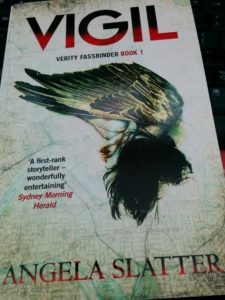 The lovely Dr Anita Harris is presenting a paper next week, and Vigil is one of the subjects! Always thought I’d be dead and dusty before something like this happened – if at all!
The lovely Dr Anita Harris is presenting a paper next week, and Vigil is one of the subjects! Always thought I’d be dead and dusty before something like this happened – if at all!
The 17th Biennial Symposium on Literature and Culture in the Asia-Pacific Region
“Seas, Rivers, Cities: Fantastic Psychogeographies of Malacca and Brisbane in the novels of Yangsze Choo and Angela Slatter.”
Abstract:
“This paper proposes to examine the ways in which Gothic fantasy and Urban fantasy novels repurpose and reconfigure the architecture and geographies of cities through a psychogeographical perspective. Two cities in the Asia Pacific Region will be explored in this comparative analysis: Malacca and Brisbane through the works of Yangsze Choo (The Ghost Bride) and Angela Slatter (Vigil, Corpselight). In the work of both authors, the familiar is made strange and uncanny through alternate fantastic versions of both cities. Both Malacca and Brisbane are near-coastal cities, albeit inland enough that their identities are defined by rivers rather that the sea. However, both cities are steeped with hybrid cultures from different countries that overlap and inform each other. In Yangsze Choo’s Mythopoeic Award-nominated novel The Ghost Bride, the streets of Malacca have an analogue in the underworld, and the protagonist’s odyssey through it brings her through landmarks such as the Stadhuys. Similarly, in Slatter’s Vigil, the narrative roots through familiar Brisvegas landmarks and streets such as West End and Boundary Street, revealing a hidden supernatural hierarchy interspersing the day-to-day and the mundane. Rated as urban fantasy, Slatter’s Vigil has a supernatural protagonist embroiled in a war on the streets of Brisbane. In both Choo’s and Slatter’s novels hidden hierarchies and geographies are superimposed upon the day-to-day and the mundane. Through a Gothic and psychogeographical theoretical framework, this paper will unearth the ways in which the geography of both cities leave an impact upon the surreal and speculative visions of both authors, and what these visions reveal about human hopes, wants and desires as framed by buildings, streets, and the less tangible liminal structures between life and death.”



